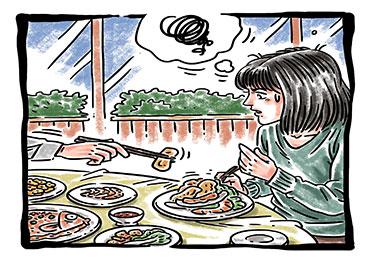For the longest time I thought that it doesn’t matter where you were raised, if you’re raised, by Chinese parents, you’re Chinese… Let me rewind a tad first. Both my parents are Chinese, I was born in China, and grew up in the US from the age of 7. I still identify as Chinese-American. I look like everyone else here and I speak the language like everyone else (most of the time). So, it wasn’t until I started dating my now husband that I realized that even if we’re both Chinese and have similar shared experiences like tiger moms and studying abroad, him in the UK and me in Switzerland, things are not always the same.
When I met my now-husband I was just starting my new life in China. I’d just started my first real job in the same industry as him. We had a common language.
But it wasn’t until things started getting serious that small nuances started raising my eyebrows.
First off, it turns out that even with his years studying abroad, he’s still pretty traditional. While I called everyone “honey” and “babe,” him calling me “honey” was a big deal. To him, it showed that he was serious. I, on the other hand, threw out those words like Oprah with giveaways. What can I say, they’re super handy when you can’t remember so-and-so’s name!
Then, when we went on dinner dates he’d put food on my plate and tell me to eat. I remember very clearly thinking to myself “Um, hello! I’m a 20-something year old woman. I know what I want to eat and how to do it. Why are you being so pushy?” When I’m eating a Chinese-style meal, I eat everything I’ve picked out and put on my small plate. This guy was messing with my system! It wasn’t until a few years later that this came up. I was surprised to learn that picking out food for someone and putting it on their plate is a traditional sign of respect and care. I had no idea… And just like that, all those times his actions annoyed me suddenly became adorable, and I was grateful that I was mature enough to not let something small and misunderstood get in the way of our relationship. Another thing that was a deal-breaker was how he’d insist on sending me home, even though we lived on the opposite side of the city. Now, let me remind you that I grew up in the US and we were big on warning young girls about stalkers. That, plus my obsession with crime thrillers, turned his sweet gesture into red flags. After we moved in together, I told him just how creepy his “I need to send you home” was, and he answered “that’s how you show care and affection for your partner. Plus, you used to live in a dodgy part of town and I wanted to make sure you were safe.” I didn’t realize I was the girlfriend from the dodgy side of the tracks.
But it’s not one-sided. There were plenty of things about me that he found strange at first, like insisting on paying for a meal. It’s perfectly normal behavior for me because we’re in an equal relationship, but it took a while for him to get used to it, and not feel my actions were a passive-aggressive way of saying he couldn’t afford something.
In the blink of an eye, we’ve been together for a decade. And during this time we’ve both left the cultural practices that we were brought up on and made our own. We respect boundaries and alone time without there needing to be a long and detailed explanation as to why. We fight, make amends, and sit down to discuss why the fight happened and how to prevent it in the future.
Most articles on cross-cultural relationships advise that you need to learn about your partner’s culture and keep an open mind. But it’s not a one-sided effort. Whether you’re of the same nationality or not, cross-cultural relationships add difficulties to every relationship and it’s up to you to navigate it together as partners. Gone are the days when you’re expected to say “I’m a Beijinger so I need to behave this way.” Changing isn’t a bad thing, it’s part of growing up.

 Old Version
Old Version